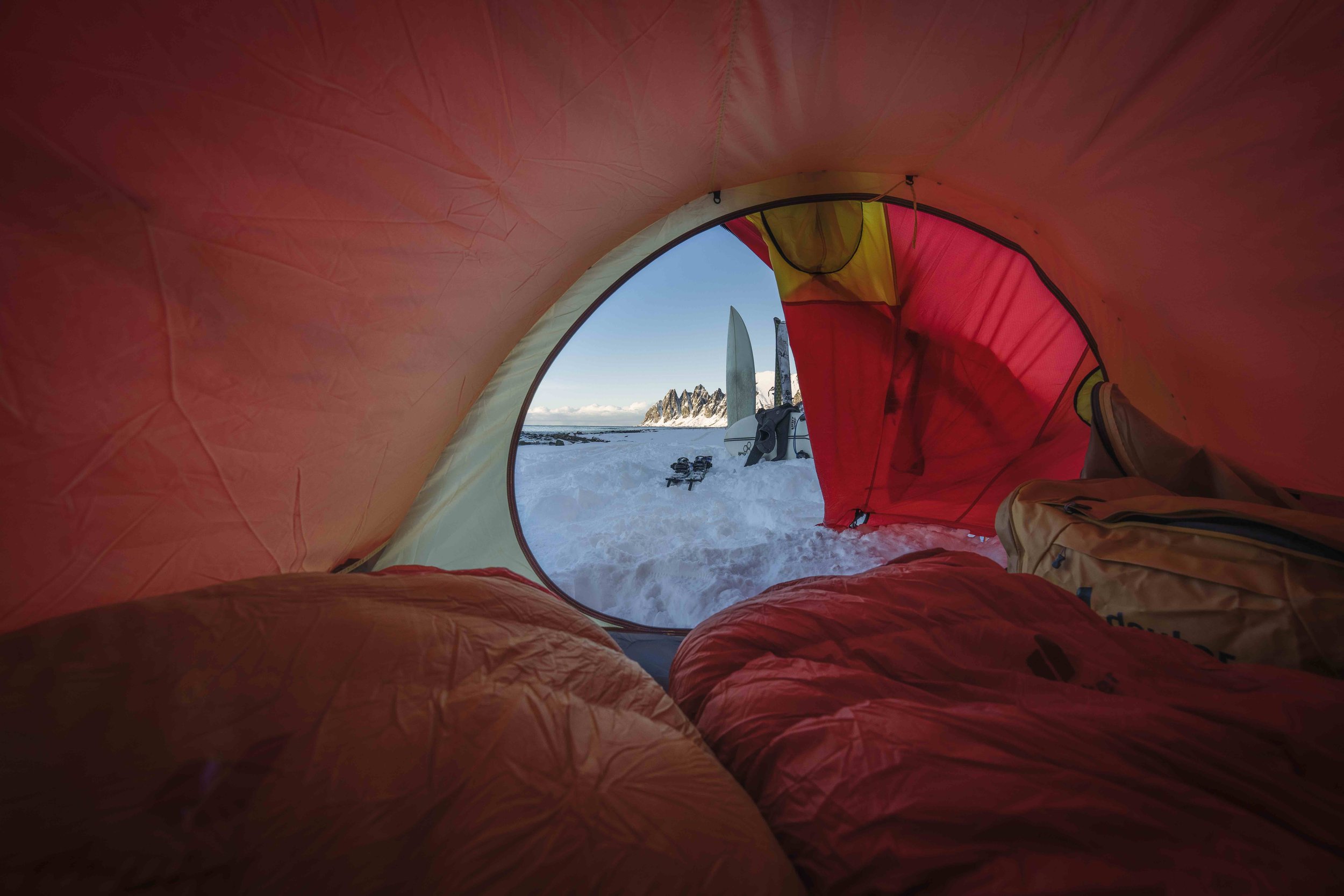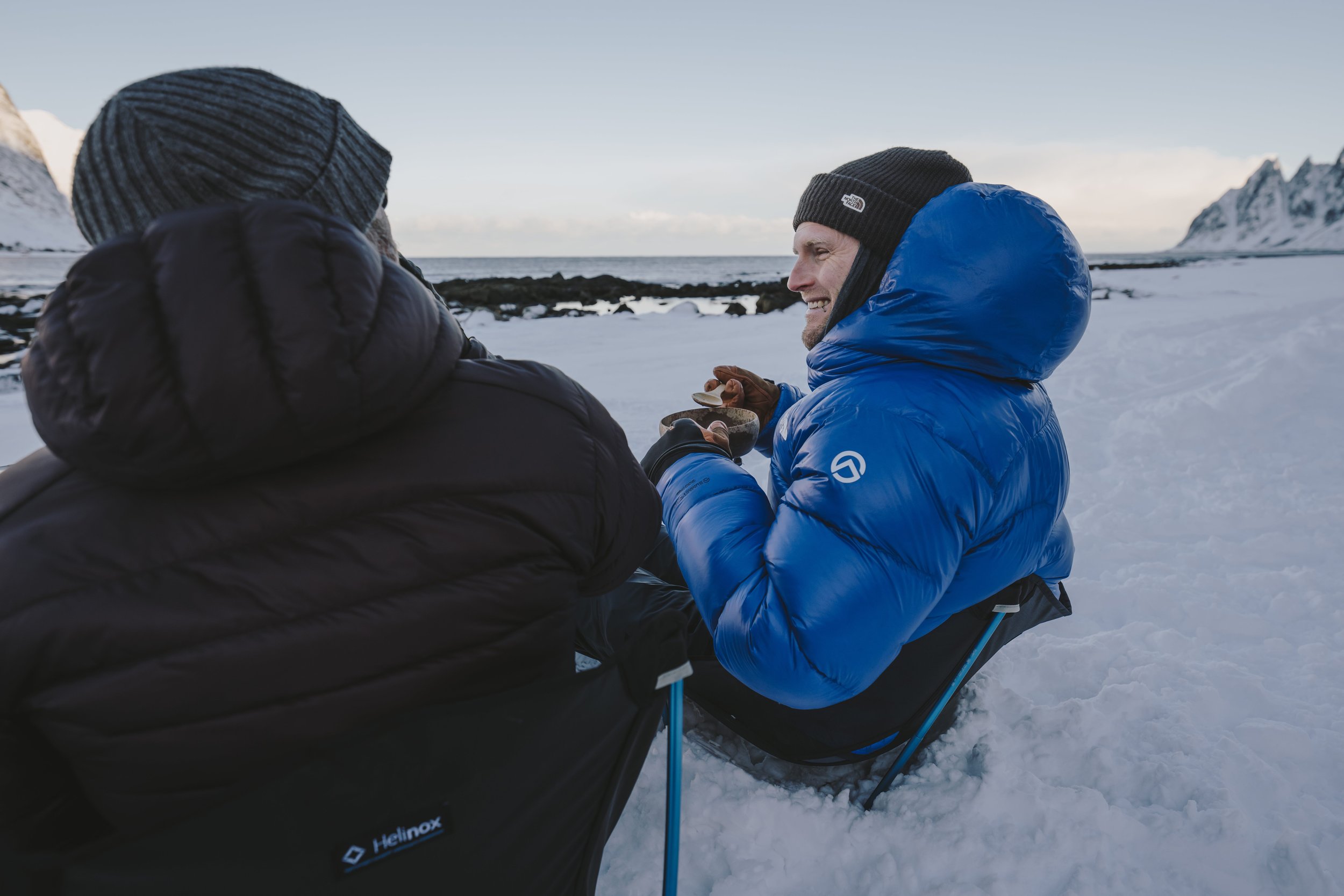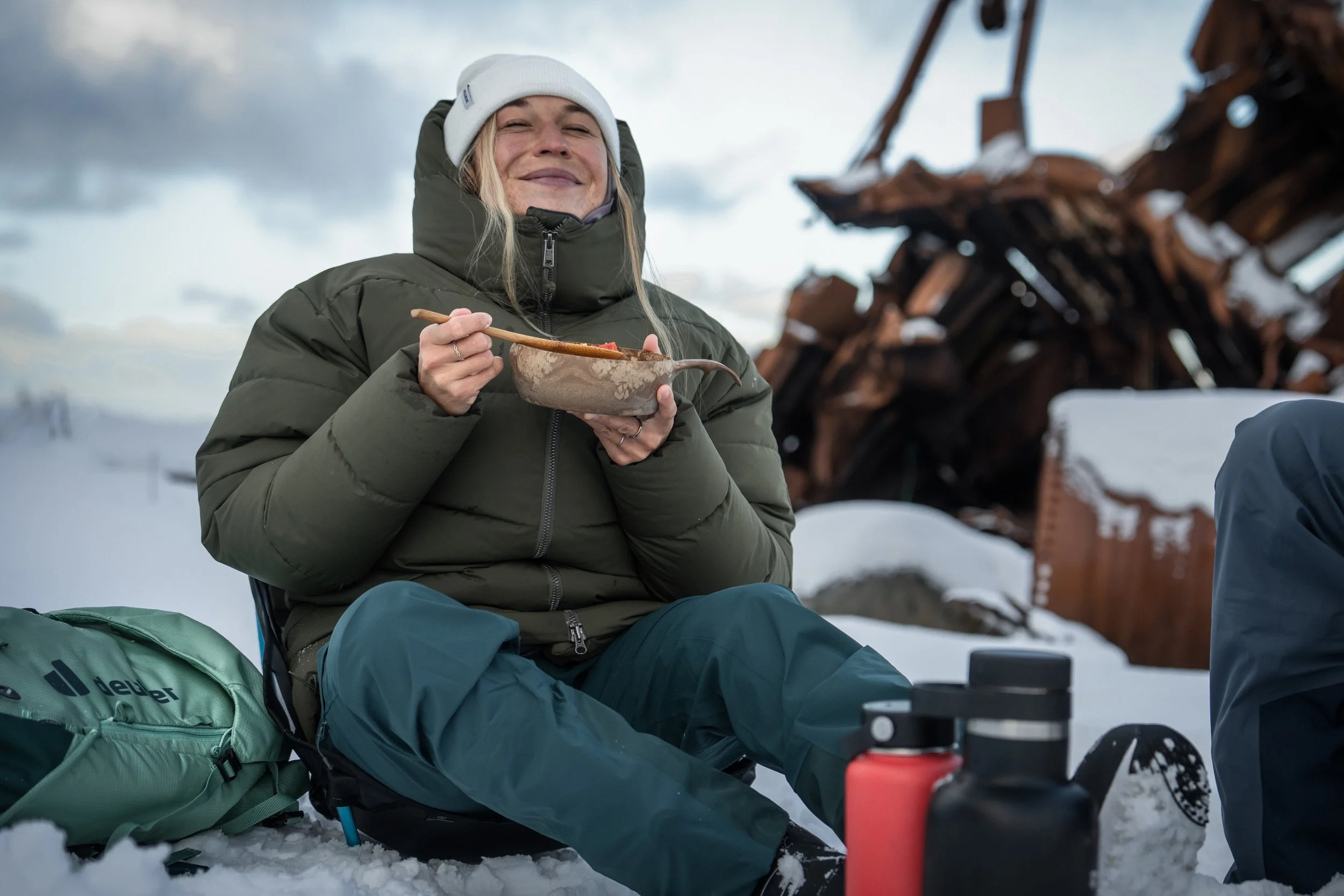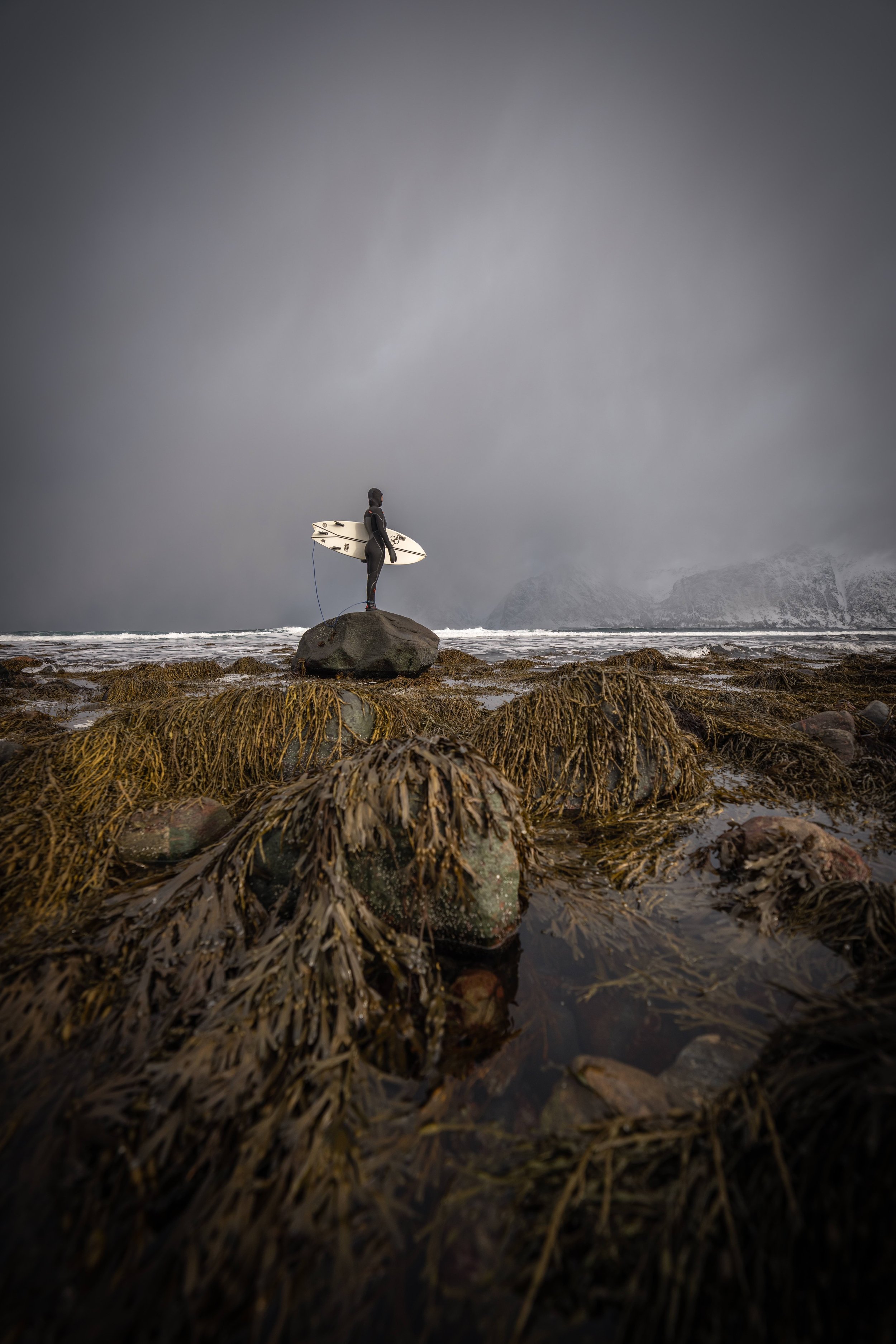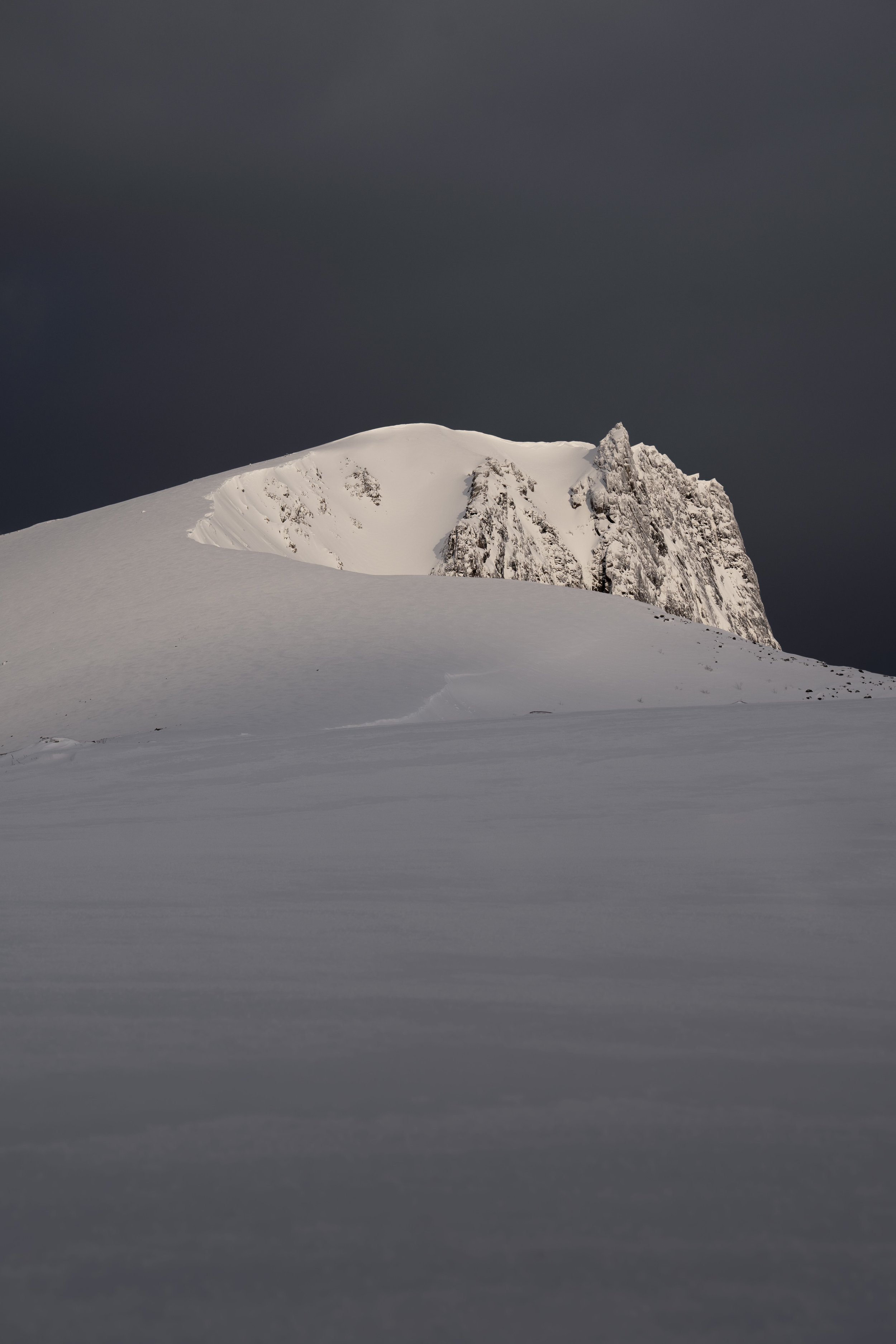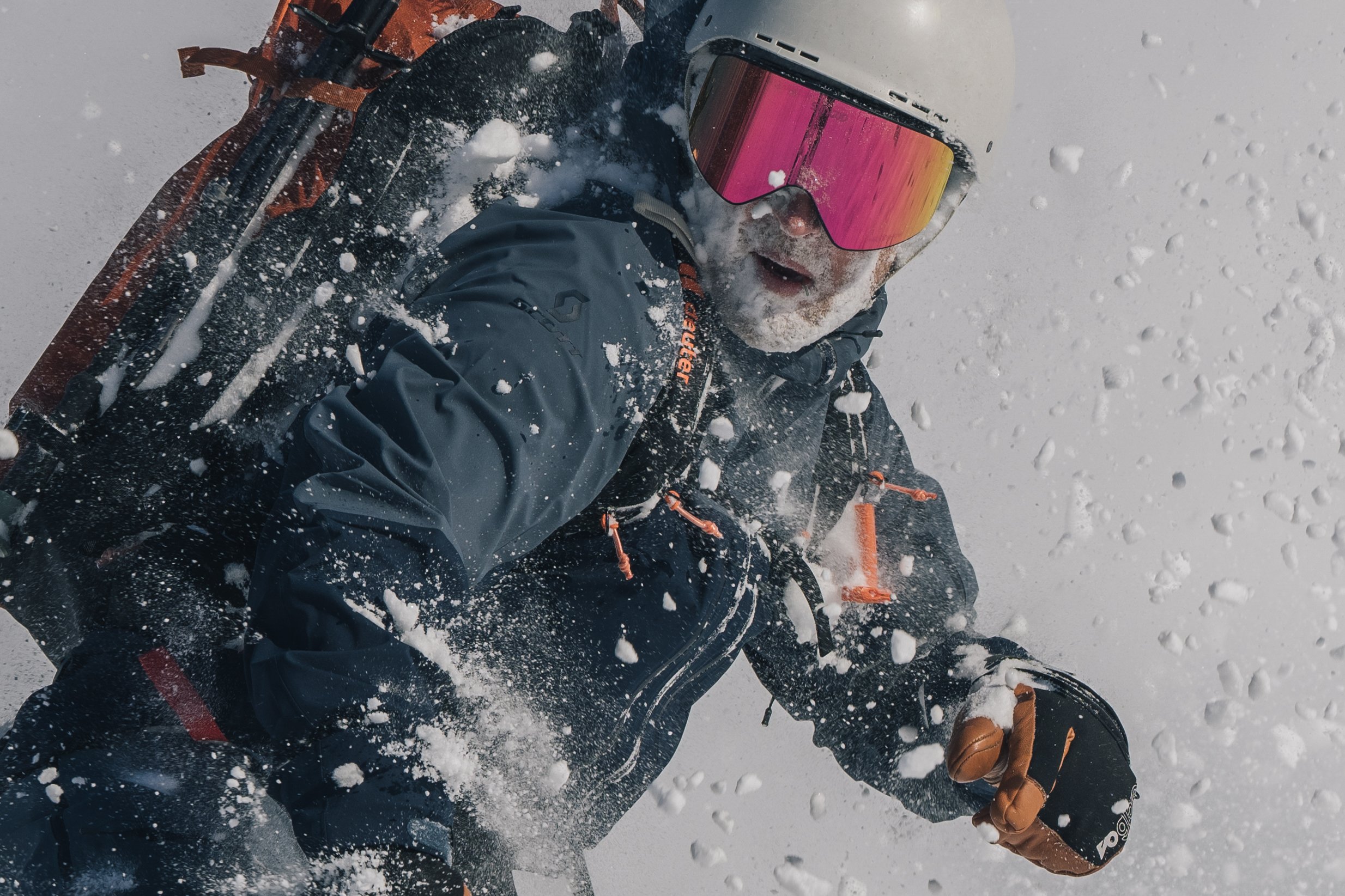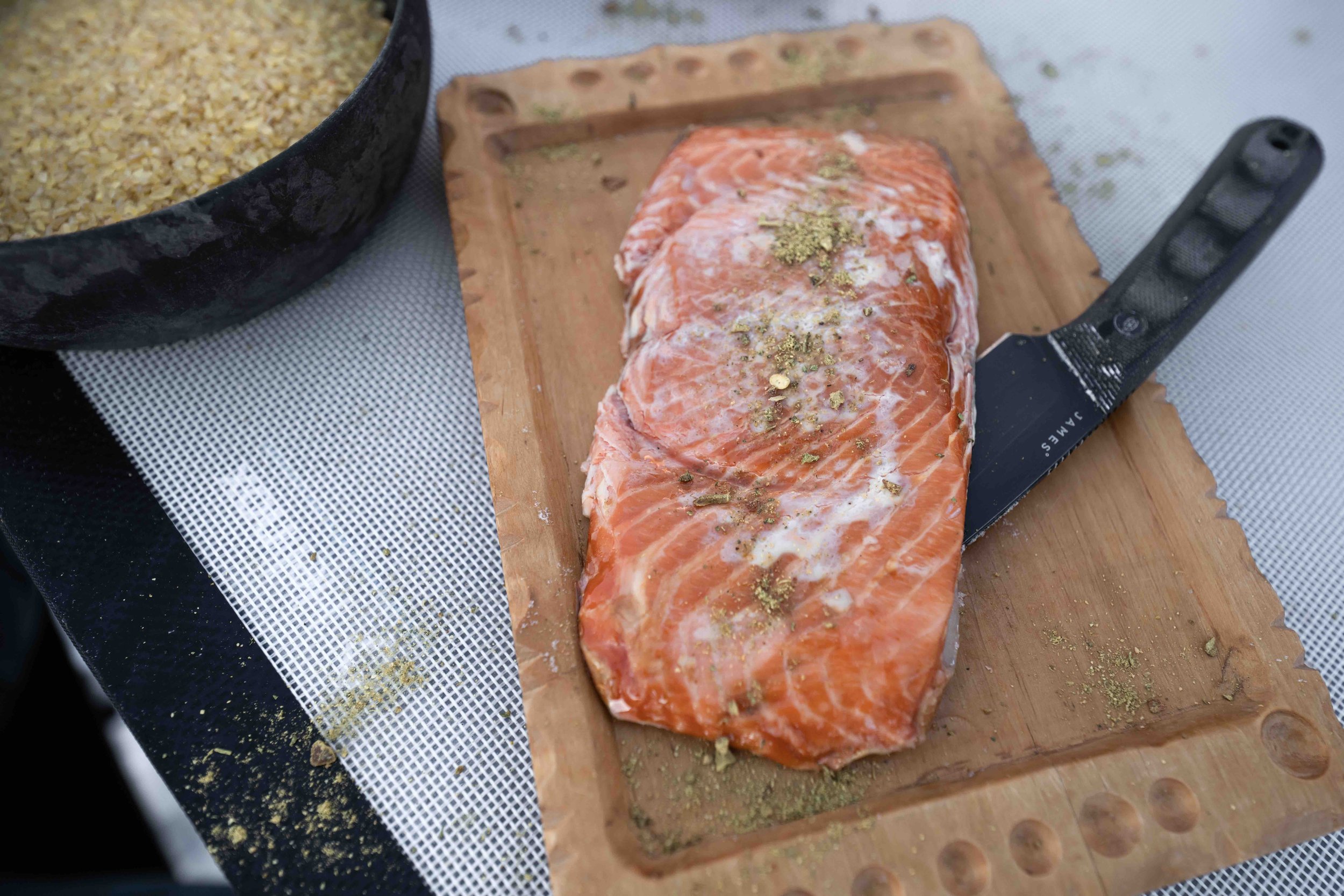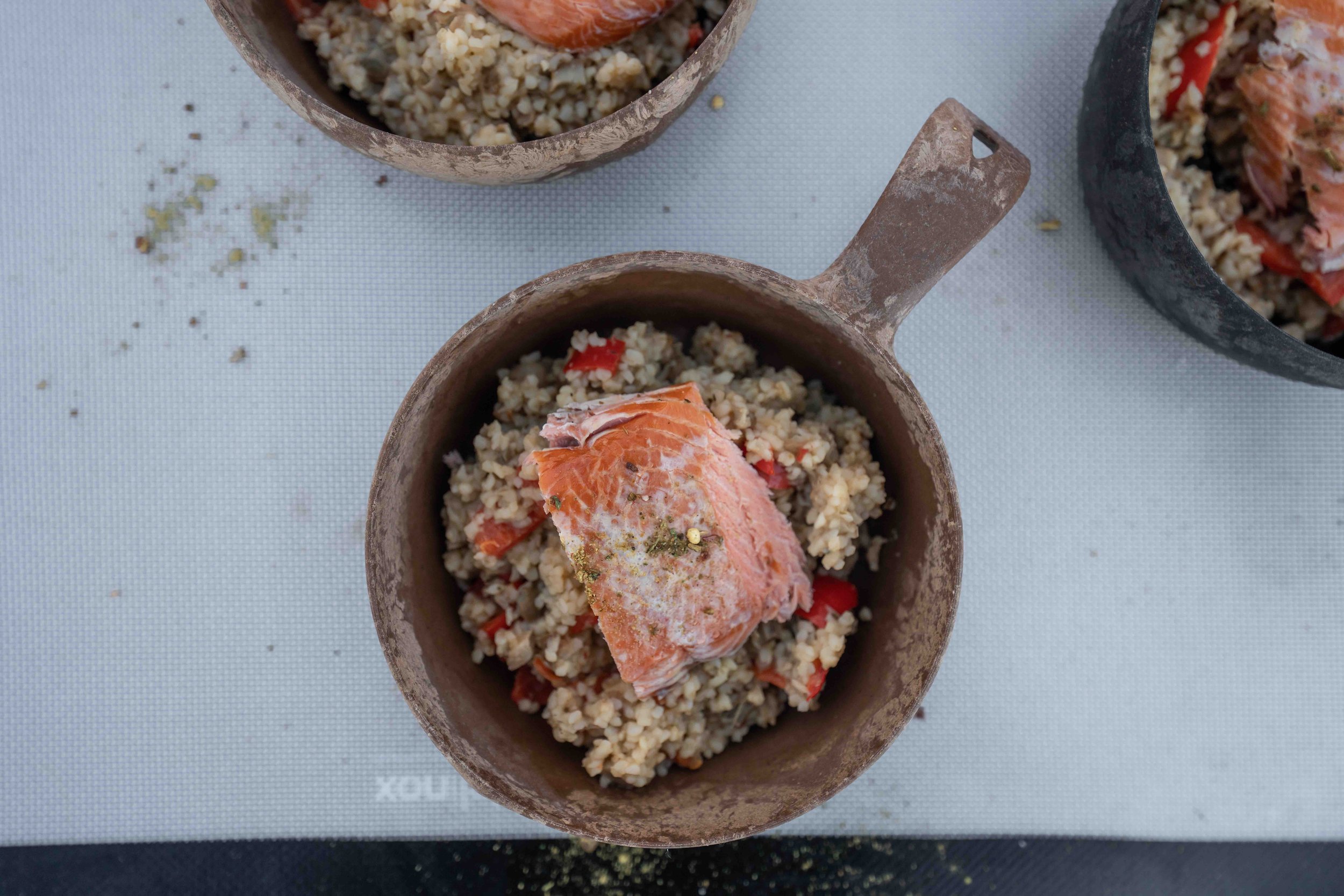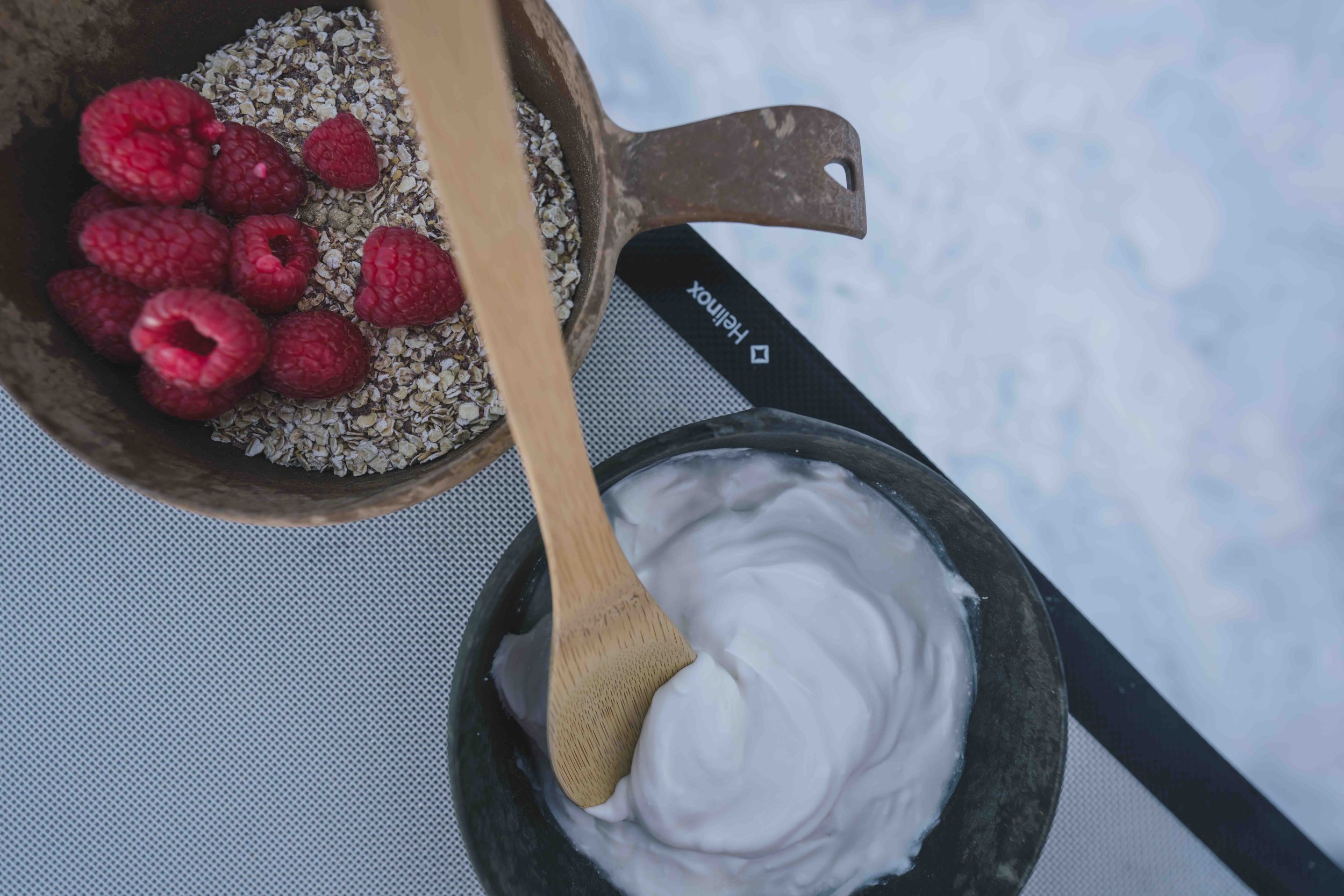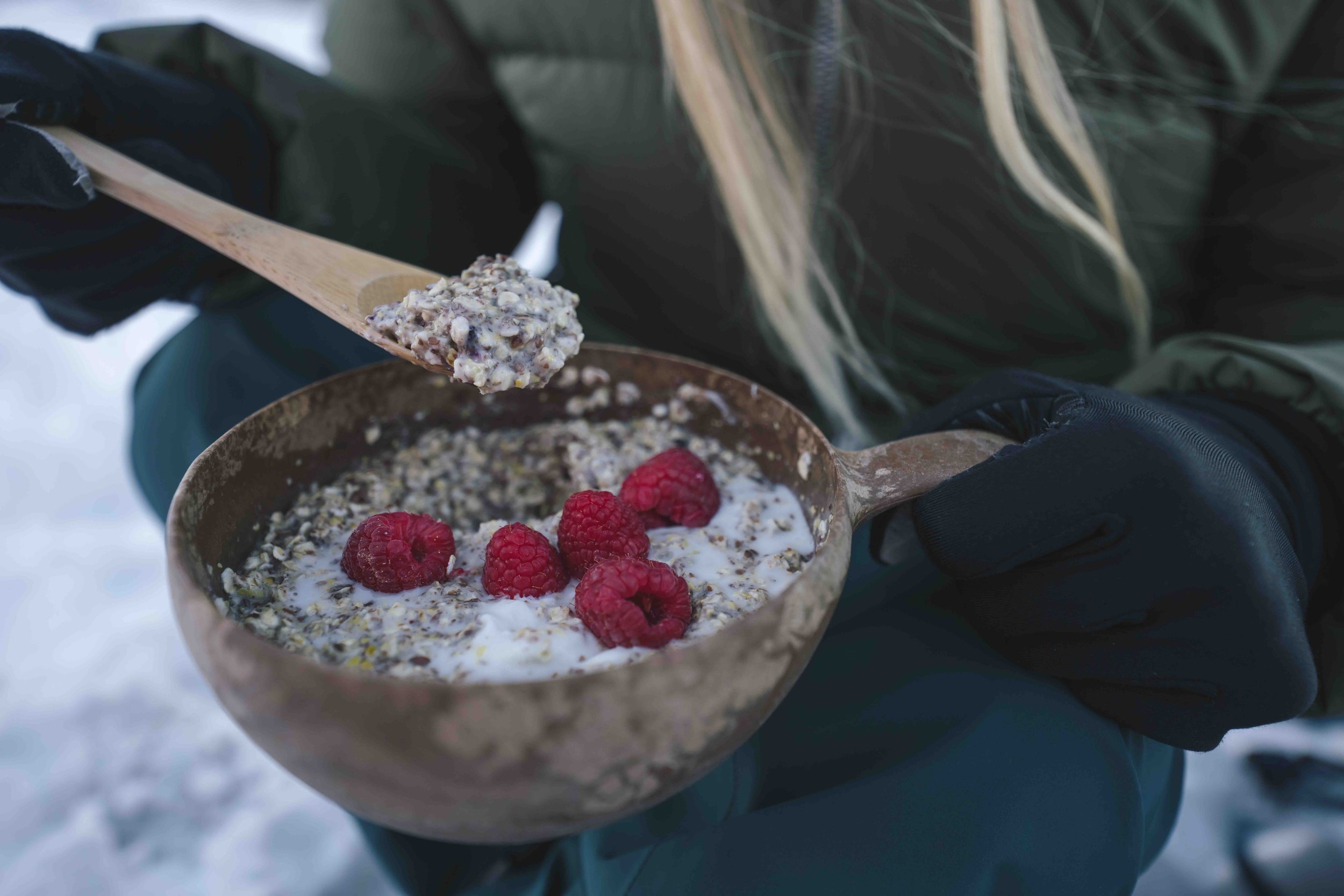Storms and silence
Photography by Lisa Paarvio
A dream project, three years in the making. With less than a week to go, the weather gods are in a capricious mood. I’m in the Norwegian Arctic at the beginning of March and I’m staring out at jagged mountains in late springtime raiment. Instead of white peaks, grass, mud and stone are clearly visible. There used to be a solid sense of predictability to the seasons. Now, winters are temperamental – areas that should be covered by metres of deep powder are scraping by with centimetres, or in our case, bare grass and stone. Then, it happened.
With less than a week to go, the skies darkened precipitously – that beautiful blue-black that heralds snow. Snow gods have answered, with more than a metre of snow falling overnight. And it keeps coming.
I meet the team at Tromso airport, and the estate car is packed to the roof with winter gear. With surfboards and snowboards strapped tight to the roof, we head into the night. Wipers on high, driving into thick snowfall. Our speed drops to 40kph, but we’re feeling invigorated.
Alarms sound early. Though the skies are dark blue-black with more snow on the way, there’s a wonderful stark beauty to this area, as though the land is painted in monochrome. Mugs of team in hand and maps spread out, we fire up the forecasts and avalanche assessment pages. To no one’s surprise, the weather has changed. From one extreme to the other. Once green and brown mountains now lie deep under snow. However, this swift change brings its own risks. From an avalanche risk of 1, it has shot up to 4 on many slopes.
Steering clear of loaded slopes, we plan routes that minimise risks and give us time to dig pits – getting firsthand knowledge of what’s happening under our skis and boards. Pulks packed, loaded with a week’s worth of food, camping equipment, surfboards and wetsuits, and clipped into skis and splitboards, we head out, not knowing what we’re going to find, but eager for the search. Moving with smooth strides, our climbing skins zip and hiss on hard-packed snow, and we accept that we have hours ahead before we reach our chosen basecamp. Wild, open, mountains rise to our back, towering above the black water below.
Tents pitched and guyed against potential storms, we’re planning our first foray into the hills when, as if linked by telepathy, Lisa, Ben and Kates turn to face the inky black sea, where maybe 200m offshore, waves are breaking in beautiful curled shapes. Soon the trio are slipping into the liquid darkness, transformed into seals, insulated against the chill.
Hours later they emerge, ice forming on strands of hair, the wetsuits beginning to stiffen in the deep cold. In dry clothes, swaddled in toasty warm winter sleeping bags, we listen to the comforting roar of the stove, good food warming us physically and psychologically.
Arms aching slightly from the hours in cold water, it’s time for our legs to burn. We’ve eyed up a few possible day tours, using it to learn about the snow conditions and scout other ideas we have.
4:30am. Airbag packs are loaded with the safety essentials (shovel and probe), warm gear and snacks, and avalanche beacons are switched on. Sparkles of light reflect off the snow from the beam of our head torches. The land is cloaked in darkness, and the heavens above sparkle with a million points of light. The snow crunches under our skins as we make our way steadily uphill through deep snow and forested hillsides. As we get closer to the peak, the first rays of the day cast their warmth on the land and our faces. In front of us opens a stunning view over the Arctic Ocean – deep fjords and icy peaks. A feast for our eyes. A sense of tranquility sets in, and there’s silence within the team. A moment suspended, taking it all in.
In front of us lies a day of whoops and hollers, and wide grind under ski goggles. Hours of carving lines in fresh powder, rinse and repeat, again and again. There’s something so wonderfully simple about expeditions, especially in winter. What matters gets stripped down to essentials. Earth – what the land gives us, both in terms of food to fuel our adventures, and as a magical playground. Fire – the fire to warm our food, the fire in our souls, fuelling our dreams. Air – each inhalation of breath helping to power our muscles, the deep gasps as the slopes steepen on the skin tracks uphill. Water – to keep us hydrated, and the circularity that what falls from the sky in this wonderful powder snow will eventually melt and help fuel the next cycle of rain, ice and snow.
I’ve had a few people tell me that they think sounds, smells and colours are muted in winter, but I’d respectfully disagree. Sure, with grass and wildflowers hidden under a blanket of snow, there isn’t the medley of colours, but just look at a snowfield, under blue sky, or under cloud. There’s this wondrous subtlety to the shades of white, depending on where light falls. When you unzip a tent door to a bluebird day, there may only be one primary colour: blue. But how that looks bounding off pristine snow… For me, moments like that are priceless.
Days pass all to fast; gasping breaths on skin tracks, and whoops of elation as we carve lines downhill. Crystals of ice on a water bottle turning a sunbeam into a rainbow on the snow. Ski jackets steaming at the top of a climb, and mugs of soup warming us as we sit on our packs, eyeing the contours for our descent. Camera gear gets saturated; climbing skins, damp with moisture hang on lines in the tent, drying overnight. All of these are minor problems compared to the elation of being able to play in this magnificent wilderness.
Recipes
Arctic char, barley, pepper and onion (serves 4)
Ingredients:
250g barley (can be substituted with couscous, bulgur, or rice)
1 litre water
1 vegetable stock cube
1 tsp salt
2 tsp ground black pepper
1 large red pepper, diced finely
1 onion, diced finely
500g hot smoked arctic char (can be replaced with hit smoked river trout, or salmon)
Method:
Heat the water to boiling.
Add the salt, pepper, stock cube and barley, cook on a simmer until tender.
While this is cooking, dice the pepper and onion (if not done so already).
When the barley is cooked through, flake the hot smoked char into the pot along with the pepper and onion.
Mix well and serve.
Oatmeal, skyr and raspberry (serves 4)
Ingredients:
280g oat flakes
800ml water
50g butter
200g skyr
200g raspberries or other fruit
2 tbsp apple syrup or honey
Method:
In your stove bring the water to the boil.
When boiled, turn off the heat, add the oats, butter and syrup, mix well.
Cover and allow to soak for 3-4 minutes.
Serve with spoonfuls of skyr and fruit.



